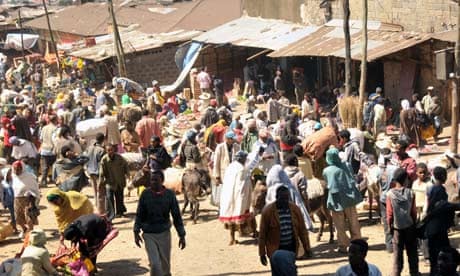Britain is to provide £38m in emergency food aid for 1.3 million people in Ethiopia, as parts of east Africa experience the worst drought in decades.
The international development secretary, Andrew Mitchell, announced extra cash for the World Food Programme's work in Ethiopia on Sunday.
"Through no fault of its own, the Horn of Africa is experiencing a severe drought caused by the failed rains," he said. "Britain is acting quickly and decisively in Ethiopia to stop this crisis becoming a catastrophe. We will provide vital food to help 1.3 million people through the next three months.
"For the response to be effective, we need the most up-to-date, accurate information on the level of need in Ethiopia. The country has made great strides in many areas over the past 30 years and this emergency relief will help to ensure that these gains are not eroded."
Mitchell urged the Ethiopian government to provide latest numbers of those affected in the country's south so aid agencies could target relief. The international development secretary also unveiled extra help for 329,000 malnourished children and pregnant and breastfeeding mothers.
Oxfam welcomed the move and said the money could not come soon enough.
"There are already critical and life threatening food shortages in Ethiopia and across the Horn of Africa region," said Jane Cocking, the charity's humanitarian director. "Two successive poor rains have left millions of people struggling to get food as hundreds of thousands of livestock have died and crops have failed. Other donors now need to follow suit and increase funding before it is too late."
Save the Children has launched a £40m emergency appeal to help thousands of Kenyan and Somali children.
"Thousands of children could starve if we don't get life-saving help to them fast," said Matt Croucher, the group's regional emergency manager for east Africa. "Parents no longer have any way to feed their children. They've lost their animals, their wells have dried up and food is too expensive to afford."
Thousands of Somalis have left their homes in search of food, with malnourished children walking for days in searing heat and risking conflict to find help.
In Kenya, there are reports of people feeding their animals the thatch from the roof of their huts in a bid to keep them alive, leaving families without adequate shelter. Many children are eating just a single bowl of porridge a day, missing out on the basic nutrients they need to survive, says Save the Children.
The UN office for the co-ordination of humanitarian affairs estimates that 10 million people across the Horn of Africa are facing a severe food crisis following a prolonged drought in the region, with some areas of Djibouti, Ethiopia, Kenya, Somalia, Ethiopia and Uganda, experiencing their worst drought conditions in 60 years. The Kenyan government has declared the drought situation a national disaster, with malnutrition mortality rates in northern Kenya exceeding emergency thresholds.
UN humanitarian appeals for Somalia and Kenya, each requesting about $525m (£326.6m), are barely 50% funded, while a $30m appeal for Djibouti has reached just 30% of the target, say UN officials.
